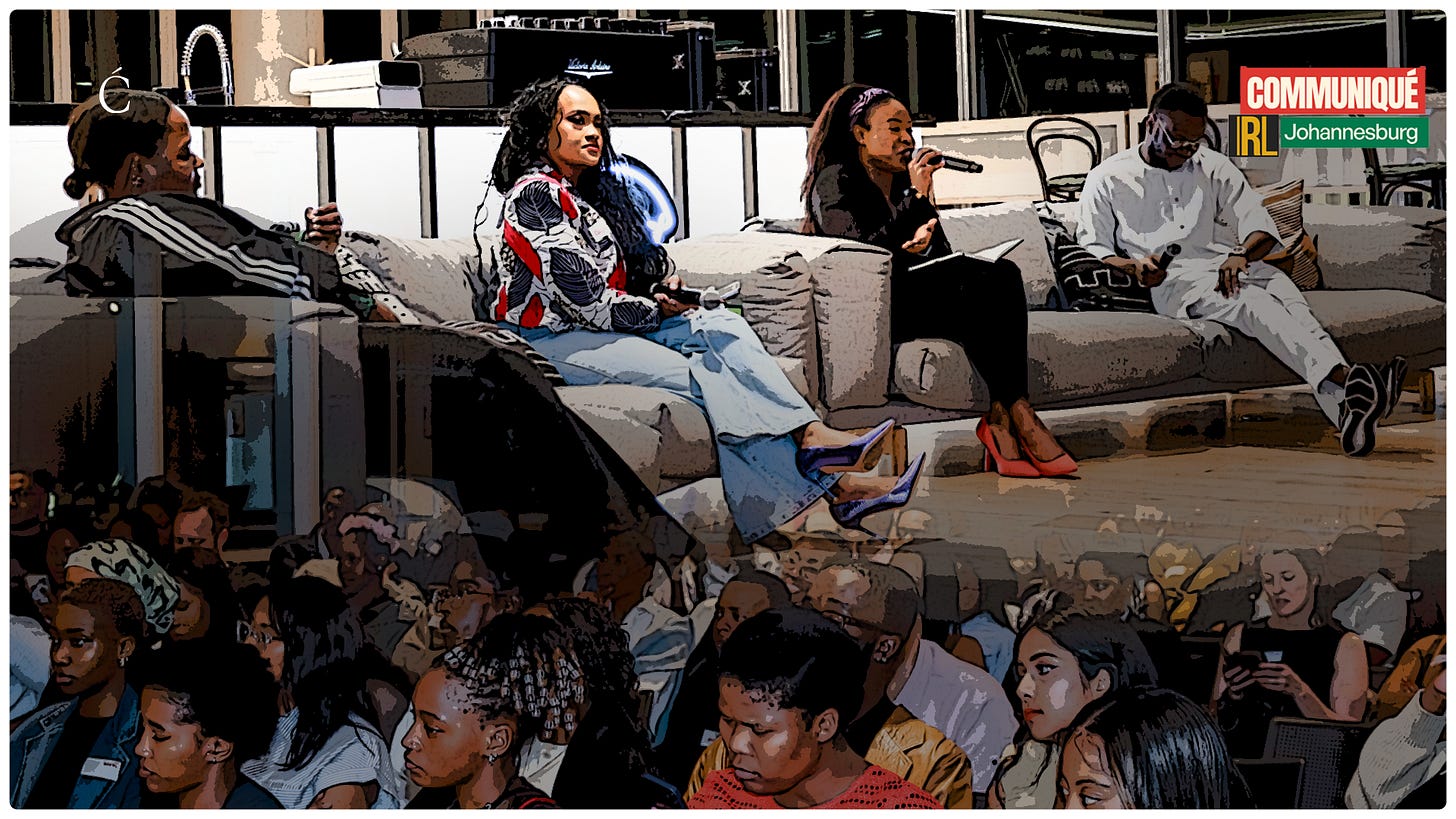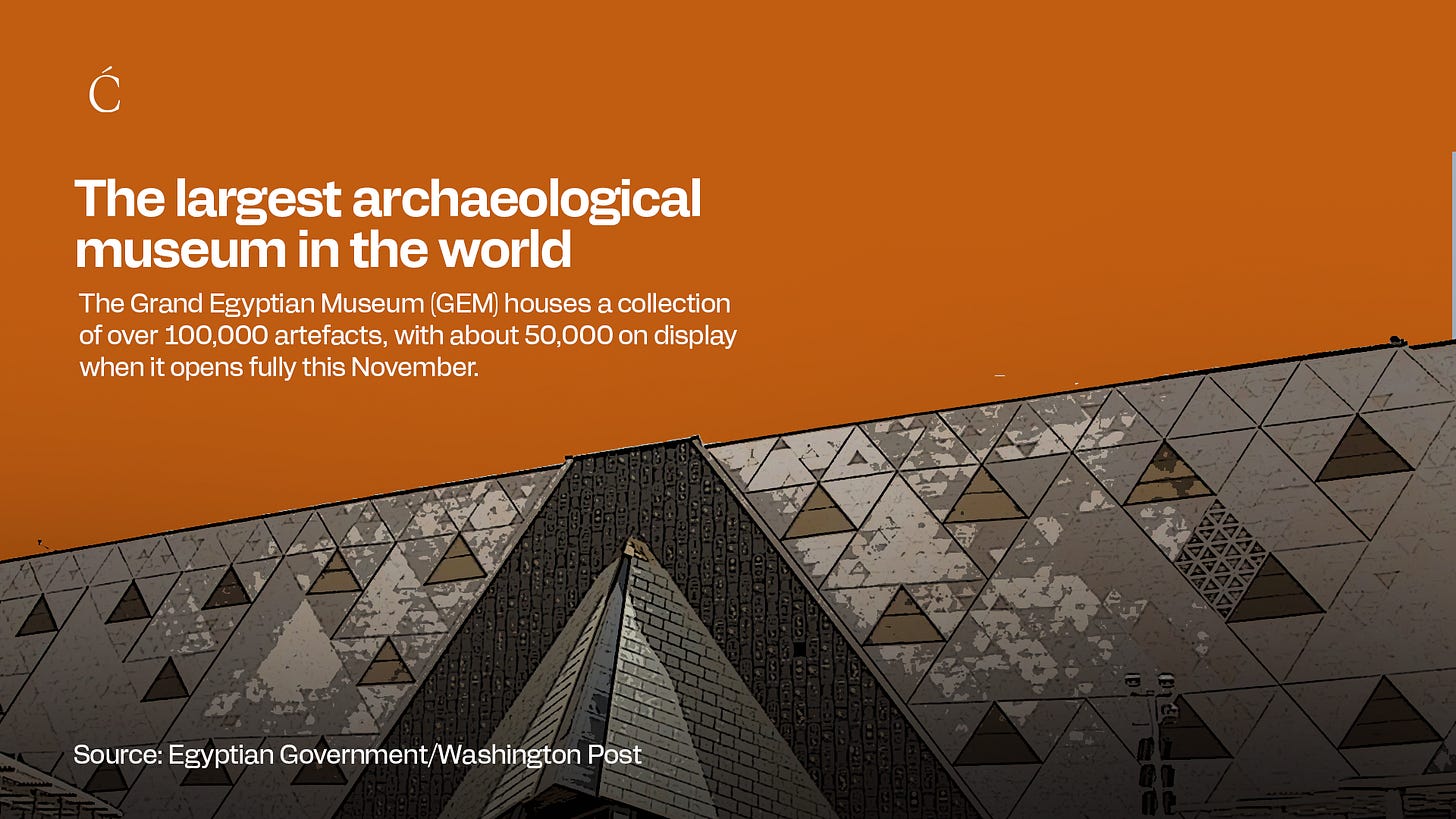Third time’s the charm in Joburg for Communiqué IRL + Japan eyes Africa’s animation boom
The big ideas from Communiqué IRL Johannesburg and Japan’s quiet push in Africa.
Hello!
Communiqué IRL Johannesburg was a blast! The energy in the room was electric, and the conversations cut straight to the heart of South Africa’s creator economy. A big thank you to everyone who joined us.
If you couldn’t make it, don’t worry, we’ve got you covered, as always.
In today’s issue, we break down the key lessons from the night and Japan’s growing interest in Nigeria’s and Africa’s animation industry.
Centre Spread 🗞️
What we learnt at Communiqué IRL Johannesburg
South Africa’s creator economy is thriving, but can it scale across borders and build lasting enterprises? That was the central question at Communiqué IRL Johannesburg, held yesterday evening and powered by TikTok. The event brought together creators, media leaders, and executives to explore how South African creators can transition from content creation to building sustainable, job-creating businesses with regional and global impact.
For many of the speakers, the transformation begins with a mindset shift. Kayise Ngqula, a television host and founder of KNN Media Network, said creators must stop seeing themselves as mere influencers and start thinking like business owners. “For me, that was the catalyst,” she said. “When I think back to when I wanted to be on television, I knew there was so much more I could offer. I just didn’t know how to get the audacity to think I could do that.” She stressed that practical steps like registering a company, opening business accounts, understanding tax obligations, and creating multiple revenue streams from syndication, to advertising and events are essential for long-term growth.
TikTok’s Head of Content Operations for Sub-Saharan Africa, Bonsiwa Sidwaba, added that structure builds credibility. “People are going to invest in something you’ve built,” she said. “You have to be able to say, I’ve built this, I’ve done this.”
Sidwaba also emphasised that success in the creator economy doesn’t require expensive cameras or studios, but consistency and authenticity. “TikTok allowed creators to realise that you don’t need a lot of money or fancy gear,” she said. “You can start creating from where you are.” She noted that the creators who thrive are those who keep showing up. “At the beginning, you might feel like, oh, it only got 100 views. But the creators who have made it today are the ones who were consistent.”
Sidwaba noted, that audiences value authenticity over polish. Rather than waiting for the perfect setup, creators should focus on being real and consistent, adapting their content to fit each platform’s unique style and community. She explained that understanding platform nuances and creating native content often determines whether a creator blends in or breaks through.
Communiqué founder David Adeleke built on this point, observing that while South Africa’s creator ecosystem is one of the most advanced in Africa, it remains too insular. Collaboration, particularly cross-border partnerships like those driving growth in Nigeria’s creator scene, will be key to expanding South Africa’s influence and unlocking new opportunities across the continent.
Ngqula echoed that sentiment, reframing collaboration as both a mindset and a strategy. “You’ve got to move from thinking, ‘my intellectual property is mine,’ to ‘how can I collaborate so everyone gets a piece of the pie?’” she said, citing South African creator Lasizwe as an example of someone successfully expanding his reach beyond the country’s borders.
Beyond creative output, speakers also emphasised the importance of creators engaging in policy and regulatory conversations shaping the industry’s future. “One of the biggest parts of our work is policy,” Adeleke said. “As an industry, we’ve allowed people who don’t understand our nuances to define our destiny.”
Ngqula emphasised that events like Communiqué IRL should spark lasting industry engagement, not end when the lights go out. The Johannesburg edition wrapped up the Communiqué 2025 IRL series, following stops in Lagos and Nairobi. Adeleke hinted that next year’s return would be “bigger, bolder, and better,” as Communiqué continues its mission to connect Africa’s creative economy.
The key takeaway from the evening was clear: South Africa’s creator industry has the talent and ambition to lead Africa’s creative charge, but scaling beyond its borders will require structure, collaboration, and a united voice.
Japan’s interest in Nigeria’s and Africa’s creative sectors
Can you imagine what it would look like if Nigerian or African stories were told in the Japanese anime style? You might not have to imagine for long. A non-profit founded by two Sony Group employees, Arc and Beyond, has partnered with the Japan External Trade Organisation (JETRO) to launch a program that will train African animators and foster creative exchange between both regions.
The initiative, titled “TAIDO African Animation Challenge 2026,” will run from October 2025 to March 2026. Featuring Ghana’s Animax FYB Studios and Nigeria’s Comic Republic’s CR Motion Plus, the program aims to develop animation talent and build industry connections. According to the organisers, TAIDO—meaning “awakening” or “first stirrings of life” in Japanese—captures the project’s goal of sparking new growth for Africa’s animation industry.
Nigeria’s animation scene has been expanding rapidly and gaining global attention, but progress is slowed by limited access to skilled talent. This collaboration could help close that gap by equipping young creators with training and exposure to Japanese animation techniques.
The program also fits into Japan’s broader push to strengthen cultural and creative partnerships with Africa. At the 2025 Lagos International Trade Fair, JETRO will host Super Japan in Lagos—its first pop culture-focused event in Africa. The showcase will unite local anime fans, creators, and Japanese companies through exhibitions, workshops, and stage programs, including a presentation from the TAIDO project. JETRO says the event marks “a new path” for Japanese companies exploring pop culture markets on the continent.
Crunch Time 📈.
Curiosity Cabinet 🗄️
The print revival of South Africa’s NAG Mag and the print debut of Nigeria’s Culture Custodian signal a broader shift in African and global media. This week’s Communiqué essay posits that the move isn’t driven by nostalgia but by a desire to build credibility, assert permanence in a digital-first world, and open new revenue streams.
In this week’s edition of Offscript, one of Nigeria’s most promising filmmakers, Dika Ofoma, tells us how he is building his career, one indie short film at a time.
What kind of creator are you? Get a rough idea with this short quiz.
Here are the events happening across Africa’s creative economy this weekend and next week:
November 1: The opening ceremony of the Grand Egyptian Museum in Cairo, Egypt.
November 2 – 8: The 14th edition of AFRIFF holds in Lagos, Nigeria
November 6 – 9: ART X Lagos holds in Lagos, Nigeria
Over 500 business leaders and investors are gathering at the Counder Conference 2026 to discuss how to support the next generation of cultural and creative entrepreneurs.
Explore more of Africa’s creative economy in one place. Communiqué’s African Creative Economy Database tracks 1,000+ companies, events, investors, and government actors across the continent.
Thank you for reading Communiqué! Please help us give Africa’s media and creative industries the coverage they deserve by making a donation here.
That’s it for this week’s Digest. See you next week.




